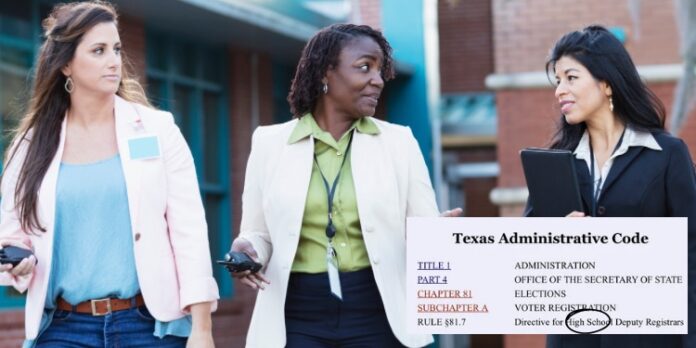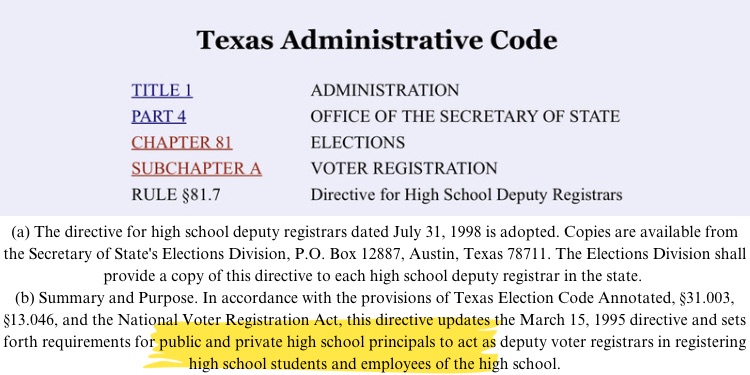Missing Out On Voting’s Value
In view of rapid changes, to election and voting laws, it is becoming even more critical that additional concentrated efforts be initiated that will broaden the pool of registered and informed voters.
Herein, we look to the Secretary of State, whose office handles election procedures, in Texas. According to the Texas Election Code (TEC) Sections 31.093 and 13.046, the Texas Administrative Code Chapter 81, and the National Voter Registration Act, outlines requirements “for public and private high school principals to act as deputy voter registrars” to provide voter registration opportunities to eligible high school students and campus employees. Is this happening in San Antonio?
Click below to Read the Full Code:
Furthermore, the campus principal designate an administrative staff member or teacher, in writing, to serve as the High School Deputy Registrar.
As far back, as October 2021, the University of Houston’s Election Lab found that “only a quarter of Texas high schools were in compliance.” This information was presented at the 2021 Election Sciences, Reform and Administrative Conference (ESRA).
Research has suggested that “voting is habit-forming” and high schools are a critical training to initiating that pattern. It’s also been found that two-thirds of 18 to 29 year olds, who planned to vote, said that their high school education “made voting feel important.”
During my high school experiences, in the 1960’s, we were exposed to Civics (government) classes, music, speech and drama competitions, which had a positive influence on our minds and led us to seeking higher education and enjoying a greater awareness of the world around us!
Fast forward to the Early voting numbers this year, from 2/20 to 2/28, on four college campuses, here in Bexar County:
Northwest Vista – 1,207 votes cast.
Our Lady of The Lake – 374 votes cast.
Palo Alto College – 204 votes cast.
San Antonio College – 399 votes cast and UTSA (1604 campus) – 702 votes cast.
Further inspection revealed minority enrollment, at each campus was:
Northwest – 72%
OLLU – 77%
Palo Alto – 70% and
UTSA/1604 site – 67%.
It appears that we must begin to invest more energy, into engaging the youth, especially those between 18 years of age to 24 years of age. The objective is to assist them, in their development of political awareness and responsibility, particularly as the future unfolds.
This issue further demands accountability from School Boards, Superintendents and those who are required to address the community’s concerns. More to come, in the manner of responses from the aforementioned parties.
Vote – You’ll Be Glad You Did!







